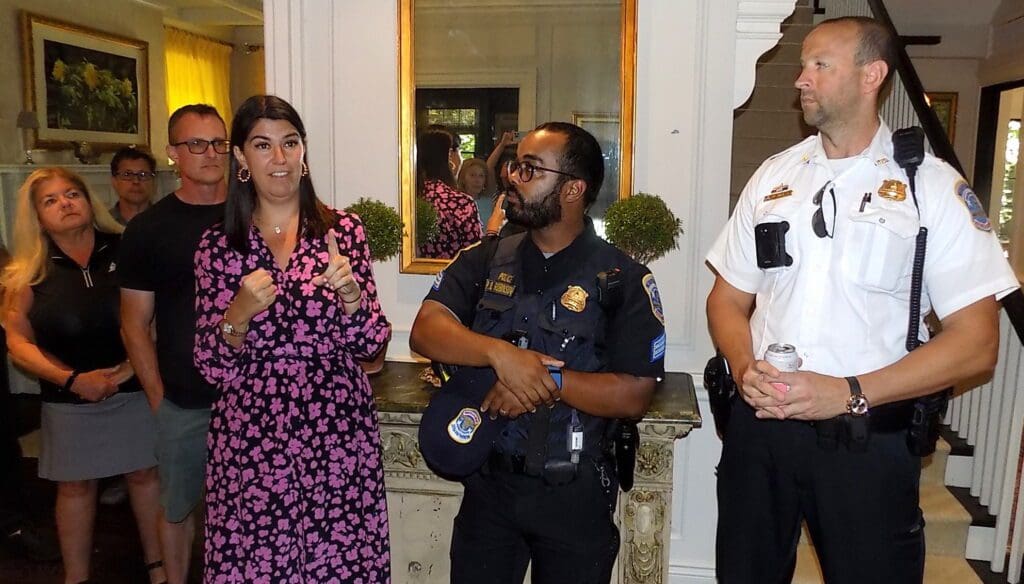Citizens Meet with Police and Brooke Pinto on Crime
By • August 14, 2023 0 2264

Considering recent criminal activity on the 3300 block of N Street, the Public Safety Committee of the Citizens Association of Georgetown and neighbors met with the Metropolitan Police Department’s Second District Lieutenant John Merzig and Sergeant Philip Robinson on the afternoon of July 26 at the home of Tia and Joe Lotuff at 33rd & N Streets. Merzig and Robinson listened to concerns about crime in Georgetown and shared how MPD is dealing with the recent increases in crime. All CAG members and concerned Georgetown residents were invited.
Attendees were introduced to CAG’s Public Safety Leaders, Kate Hasty and Mark Martinkov. CAG Executive Director, Brittany Sawyer, said that CAG is undergoing a strategic review of its Public Safety Program in light of the increase in serious crimes, especially ones involving guns and cars. Also on hand was Ward 2 Council member Brooke Pinto, who chairs the Committee on the Judiciary and Public Safety and was instrumental in pushing for passage of the Emergency Crime Bill.
Lt. Merzig reported that residents need to be especially careful and “very vigilant” in transitional spaces, such as going from car to home. “Trust your gut,” he said. They are now seeing “cars being driven with up to four guys with guns jumping out of the car to rob and hijack the car.” As an example, in what is usually a low crime area, such a crime occurred at MacArthur Boulevard and Foxhall Road on July 25. The threatened car turned around and fled.
Carjackings and the use of guns have become more frequent, and many of the criminals are young. Police used to see a pattern of young people committing crimes and using a gun after multiple crimes, but some young men’s first crime now involves the use of a gun. The decline in safety and a sense of how unsafe it is even in Georgetown is very worrisome and hurting the city’s image.
Repeated crimes occur because, Merzig said, “they see there are no consequences for committing crimes.” The amount of increase is “unprecedented.” He added that the “police often deal with victims for whom this is the worst day of their lives and suffer long-term trauma.”
“We in Georgetown feel that the city is less safe, including in our neighborhood, and we are not wrong,” said one CAG member. “Tragically, it is, of course, much worse in other parts of the city. The number of deaths, including innocent bystanders, is very disturbing, and Metro is threatened too.”
When asked about what is needed and what residents can do, Merzig, Robinson and Council member Pinto repeated that residents need to:
1) turn on their lights every night;
2) be extra vigilant, walking with earphones — paying too little attention to surroundings is dangerous;
3) be ready to turn over phones, purses, money, wallets in stick-up situations;
4) call 911 to report any crimes or suspicious behavior;
5) try to obtain a home security camera, if you one is not at home already. (D.C. subsidizes the purchase of outdoor cameras.)
Merzig addressed the problem of recruitment and retention of police officers. “We need to rebuild the force,” he said. Even methods of maintaining the force by recruiting from the military and other forces from the federal government, such as the U.S. Park Police, are not as productive any more as needed, he said.
Also, Merzig said, “Our total Metropolitan Police Department is way down. Some years ago, when the population was smaller, we had 4,000 employees (police officers and other MPD employees), but now we have only 3,380.” He added: “We lose from retirements, limited hiring success and resignations when officers are recruited away by jurisdictions with more community support, higher pay and better benefits.”
One attendee offered: “Council members need to hear how important it is to support criminal justice reform legislation to produce a better system of retaining those arrested for serious crimes, sadly including some young men committing violent acts. We should insist on fully funding the police officers needed, including benefits that are highly desirable and will help to attract officers. Allowing all officers to keep their cars, for commuting not only is considered a valuable benefit, having more cars around the city and parked in neighborhoods, not police garages, give a greater sense of safety and protection.”
Another opinion offered was that “Police officers face a long list of challenges and hardships. If we want to be safe and have a well-functioning system of justice, then we have to make sure we have a good, strong police officer corps, as well as mental health and other trained professionals who can work with the police and 911 to get the right care at the right time for the mentally ill and unhoused people who may also be threats.”
“Many neighbors are frightened by the mentally ill who wander around Georgetown and in the parks, often shouting in the nighttime. Better ways to deal with the problem are needed. Unfortunately, police and mental health professionals are needed in most of those instances. They can’t be handled only by mental health workers.”
Pinto said she continues to work to improve the situation and told attendees “not to lose hope.”
The group at the meeting spoke of possible solutions for improved safety and crime control in addition to the MPD. According to Sawyer, these topics will be a part of CAG’s Strategic Review.
Helen Darling, volunteer Block Captain for CAG, contributed to this report.

